- Home
- Patti Smith
Auguries of Innocence
Auguries of Innocence Read online
Auguries of Innocence
Patti Smith
A skylark wounded in the wing,
A Cherubim does cease to sing.
WILLIAM BLAKE
Contents
Epigraph
The Lovecrafter
Worthy the Lamb Slain for Us
Sleep of the Dodo
The Long Road
A Pythagorean Traveler
Desert Chorus
Written by a Lake
The Oracle
The Setting and the Stone
The Mast Is Down
The Blue Doll
Eve of All Saints
She Lay in the Stream Dreaming of August Sander
Fourteen
Birds of Iraq
Marigold
Tara
To His Daughter
The Pride Moves Slowly
The Leaves Are Late Falling
Wilderness
The Geometry Blinked Ruin Unimaginable
Fenomenico
Three Windows
Our Jargon Muffles the Drum
Death of a Tramp
Mummer Love
The Writer’s Song
About the Author
Credits
Copyright
About the Publisher
THE LOVECRAFTER
I saw you who was myself
slightly stooped whistling mouth
with leather sack and breeches brown
striding the naked countryside
with summer bones long and dry
into the breadth of our glad day
mid afternoon the longer night
as you tread bareheaded bright
I saw you a wraith bemoan
stir the fires of the ancient ones
scarred with sticks pome and haw
as the nectar for their script
I saw you walk the length of fields
far as the finger of Providence
far as the mounds we call hills
ranges cut from the heart of slate
I saw you dip into your sack
scattering seeds where they may
as the woodsman hews his way
through oak ash and variant pines
for writing desks that shall reflect
a sheaf of lines that speak of trees
all sober hopes required within
all drunkenness as sacred swims
I saw the book upon the shelf
I saw you who was myself
I saw the empty sack at last
I saw the branch your shadow cast
WORTHY THE LAMB SLAIN FOR US
On the edge of a pasture in a confusion of stones,
obscured by the long grass and floramour,
the footprint of horror cloven and drawn.
She had a beautiful name: freedom.
Pretty little chop. Unmarketable, light
the bleating of new life.
He loved her mouth, tiny feet dressed in pleats.
Hearing her cry, he picked her up by the stem
of her throat in his thick arms slick with dew.
And he, a governed soul, broad shouldered
with eyes like Blake, lamented who bred thee, nursed
thee on mead and flowers, as he ripped her apart.
The barn was burning an indifferent hell,
engulfing little maids in their curly coats.
The field and fell lay empty as the heart.
He called to his god gasping for breath
we abandoned the farms we culled,
cut the cord, incinerated our little ones.
We did it for love we did it for man,
the hawthorn and the cuckoo,
the footpaths of Cumbria.
We did it for a beautiful name.
freedom, baa baa baa,
nothing you could put your finger on.
SLEEP OF THE DODO
The dodo sleeping, dreaming of himself,
lost in his daily doings. His wife mounted
in a menagerie of mogul extremes.
His children born and slain for sport,
with nary a nod save the wind,
echoing an old dance tune.
Funny squawks: coracoo, coracoo
swept by mist into the grotto,
the sugar plantation. Funny beaks
bobbing the swamp’s dreaming pond.
Comic bodies washed up on the craggy
shore. Funny bones, then no more.
The sun hung, bled into the clouds.
God’s bloodshot eyes, such sad surprise.
The dodo awoke, and seeing them,
slowly closed his own again.
Out of this world, into the indistinct
memory of a line that had forgotten itself.
THE LONG ROAD
Here we had best on tiptoe tread
While I for safety march ahead.
ROBERT LOUIS STEVENSON
We tramped in our black coats,
sweeping time, sweeping time,
sleeping in abandoned chimneys,
emerging to face the rain.
Wet, bedraggled, a bit gone,
trudging the grooves, chewing bulbs,
we were so hungry, tulips
blazed with ragged petals.
We adorned ourselves in pennywort,
slogged ’til spent the elected front,
the whisper of a trail we somehow knew,
rain that was not rain, tears not yet tears.
And the grail, oh the grail was just this close,
finished with foil, wrapped in sun.
Gladiolas were in bloom, bursting
from every crack. The whole world
anxious for holy mother to inspect
our chins with this familiar song—
Do you like butter?
Oh you like butter…
then set upon a hill yellow everywhere.
We mounted horses, rambled forests
mischievous fairies danced underfoot.
Branches snapped in our faces.
Our kingdom behind a chain link fence…
We grappled in the quarries, polished marbles,
knelt and shot for spoils in fervent circles.
We set up our furious camps,
our tents punctured with pegs,
nicked with pocket knives—
little foxes gauging the hard earth,
cursing the bottomland for making us soft.
We gathered rye, stuffed sacks, made pillows
for our men. We wrung the blood from soaking beds,
covered the martyrs’ rolling heads, balanced
the buckets filled to the brim,
and we saw nothing and everything.
We rode on the back of the great bear, dipping our ladle
into the milky liquor spread like a white lake before us.
Our ships boasted obscenities scribbled
on parchment sails, floating illiterate rivers overturned
in bloody pools of rainwater muck.
We blew songs of praise into horns of sacred animals—
catcalls, confessions, teenage prayers
woven into tapestries of cloistered gardens.
No mother had we now, and rapping infinitesimal threads,
vows erupted with a new violence bearing no ill will
save to be born—our allegiance to motion
and the movement of the stars.
A blue light projected from the cap of a being
we could no longer name. We climbed the stairs
into a bluer heaven scarred with streamers,
bleeding the wind. We savored the spectacle.
Then it disappeared, but we were already gone.
We possessed a new radiance. Dew dropped
from our noses. We boasted shining skin,
shedding it without a sigh. Some raised their lanterns.
Some seemed to walk in a light of their own.
Fiery mounds that were not mounds, on the horizon…
Drawing closer we fell upon masses of greatcoats
abandoned by admiralty, deposed kings’ purple,
medals of honor, regulation boots of dog tongue leather,
chits, animal hides, ermine and fleece worn by those
of high rank, princes and pilots, the magus and mystic.
Yet no rank had we fishing glad rags woven by the blind.
Ours was a country of sockets. They were empty.
And yet within one would find all a child hopes—
our own sweet story, our own sweet life,
cut with the cloth of ecstatic strife.
Once we knew where we were going, we leapt
in consecrated coats. We could have gone on forever
if not for this and that pulling at the starch of our sleeves.
We broke our mother’s heart and became ourselves.
We proceeded to breathe and therefore to leave,
drunken, astonished, each of us a god.
Now you turn out the light.
Press your thumb to the wick.
If it sticks, you will burn.
If it goes poof, you will turn
into a beam that will extinguish
with the night into a dream
peppered with gimcracks.
We saw the eyes of Ravel, ringed in blue, and blinking
twice. We sang arias of our own, bummers chanting
dead blues of hallowed ground and mortal shoes,
of forgotten infantries and distances never dreamed—
yet only as far as a human hill, turned for wooden soldiers
stationed in the folds of blankets, only as far as a sibling’s hand,
as far as sleep, a father’s command—
…the long road my children.
We broke from our moth husks alive in the night,
the sky smeared with stars we no longer see.
A child’s creed stitched on handkerchiefs—
God does not abandon us
we are all he knows.
We must not abandon him,
he is ourselves
the ether of our deeds.
The whistling hobo calls, sweeping time,
sweeping time. We sleep. We scheme, pressing the vibrant string.
Happily self conscious, we begin again.
A PYTHAGOREAN TRAVELER
Awoke in a light not known before
the lodging’s glass door mirroring
a likeness not hoped to glimpse again
clouds of my childhood, clouds of God
that supported the feet of Jesus Christ
ascending the brush of Raphael.
The young on their motorbikes do not lift
their heads nor cry: The clouds, the clouds.
They are always there—Mediterranean arias
mounting with swift and terrible calm.
Do they know me? Do they know I am here,
scribbling as they are decomposing?
The moon rises filled with moon blood
drawn from the Italian skies. Here Byron
unwound his turban and shook out his locks
as gulls dropped into the sea. The moon
knew her rival and hung like an ornament
from the ear of a bright deity curling his lips,
expelling great puffs, the clouds of San Remo.
I will sit here until dawn tripping the spine
of the stars, a Pythagorean traveler marveling
another numerical scheme, adding to his shoulder
a music not heard but attained.
Beauty alone is not immortal.
It is the response, a language of cyphers,
notes, and strokes riding off on a cloud charger—
the bruised humps of magnificent whales.
Clouds of my childhood, clouds of God
awash in rose, violet, and gold.
DESERT CHORUS
In the rich chorus of night, cosseted
beneath a web of diamonds, tiny
as mosquito eyes, a stranger mourns
the brevity of desert rain
a swaddled enemy’s cries.
Soon the sun will ascend over Libya.
Can it matter? We have bombed
Benghazi. A dazed warhead struck
the compound of our foe lying alive,
his eyes white, black rimmed.
He could be heard crying in the desert
with arms now orphaned,
his infant swept into a burlap sack.
To what purpose?
The gold leaf of surrender?
The sun will ascend. Can it matter?
A poet sealed in skin disrobed, split.
Jean Genet, a thief in flight,
astray in the weave laid down
his arms spiraling in a length
of mosquito netting, dotted with eyes
of onyx, blinking above a one-star
Paris hotel indifferent to a bugger
a swaggering son of a bitch.
How shall his soul be redeemed
If not suffered by a little girl?
The dawn breaks the tempered heart
exposing a love for all things.
Hana Qaddafi, child of the flowers,
lead him across the violent threshold
where his marvelous pals await.
His prison a house of cards
collapsing in columns of roses—
a garland for your head.
Let your ashes anoint him.
He will magnify your name.
Opal hands gathering you
in a bridal train.
WRITTEN BY A LAKE
New Year’s Day. Rain. Two candles light the room where they sleep. He writes. She confesses. This is where she weeps. She is the cause of the rain. She could not stop weeping and the sky obliged to follow.
(How is it mapped? What is the refrain? Why must the sky follow?) The heart drops in the center of an inexhaustible lake. How light the heart appears, yet how weighty a thing. A powerful stone carved in the shape of an organ with chambers pumping. How slick a shadow it leaks as its signature. Sticky, oxblood, the color of new shoes. High topped, gold laced and worn with expectations poised to ride out life on horseback. Racing from hill to hill with humor, horror, bits of Spanish stitched on sleeves.
The work wrung with this cry. Look you radiant wash yard. The sheets billow. Their wet folds tell a tale. Once there was a girl who walked straight, yet she was truly lame. She walked upright in new boots, yet I tell you her feet were bare. She lives forever, yet she lies buried in a vault of fertile air.
New Year’s Day. The wicks twist. The insistent mirror winks. An eye with time as her lashes. And if he—slipping at last, face pressed against the glass, releasing beads of spittle from parting lips—should suddenly speak, what would he say? And if she, shaken from her torpor, should rise to write, what would she write? Their table is laid with the promise of the lake. Water sighs for want of blood. It is nothing. These remains, malleable ash, are nothing. Signs for want of substance. A sack of sticks spilling order upon the surface. Words traced on a slab hewn from another forested mind.
a postscript prefiguring—
Your fingers press the door triggering a spring exposing the hard corner where you have walked. You shall not stumble. Offer a fist encasing rivets extracted from the wet pout of this time or that. Prick the hour’s hand with nothing but eyes. Think nothing of it. For what remains to flush is nothing but salt jamming the mechanism of formal delights, former misery. Nothing but salt to bundle and fling over a shoulder. Nothing but clumps of salt to toss, years later, like dice across a board of glass where you’ll sit on a ledge c
ircling a glowing body, unfastening the dressings of a burden gone. The cremation of all my sorrow—may you spread the singed grains with your fingers, and without thought brush them aside.
Thus free to drown in sorrow of your own, may you sit in the shadows of our lost life, immersed in stillness, flanked by translucent hills, one a mountain coated immaculate and ringed at the throat with beads of cloud.
These words were written by a lake.
String them around a wrist. Do not grip a sword or draw what might be drawn, for wisdom is a dying bird, engraved on a palm. Next to nothing. And these words were written by a lake, before being as being was scripted and dealt. A pack of lives, each with a winning face, each with this blushing command:
Prick this. This moment the hand is free.
THE ORACLE
He was a stone boy divined by his sister.
She slept standing while he by the rim
played with a ball the color of water,
gazing all reason therein.
He was summoned to the sibylline barren,
carried by sweetness his mouth drew the spring.
They rejoined through the ball of water,

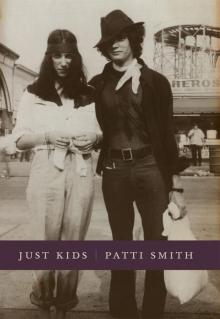 Just Kids
Just Kids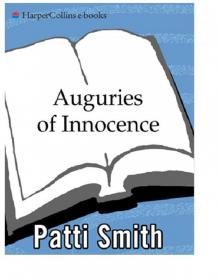 Auguries of Innocence
Auguries of Innocence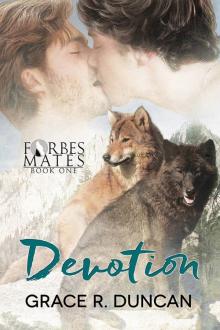 Devotion
Devotion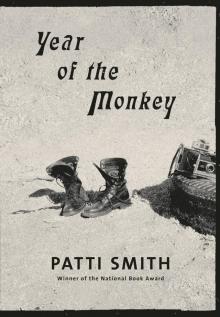 Year of the Monkey
Year of the Monkey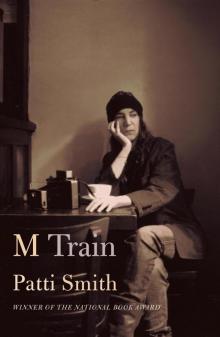 M Train
M Train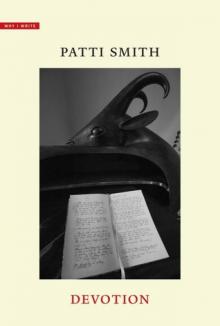 Devotion_Why I Write
Devotion_Why I Write